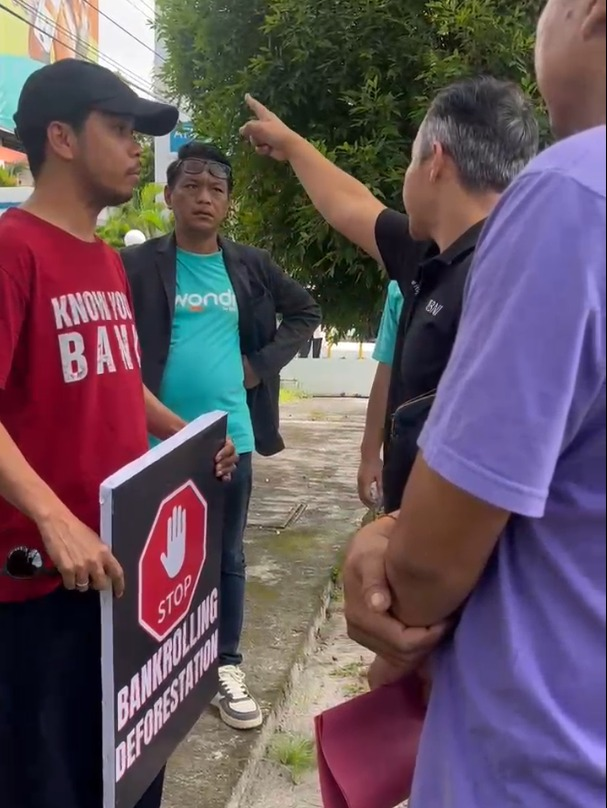25 April 2025 4 menit
BNI Muffles Non-Violent Protest, Remains Silent on Financing Forest Destruction

PRESS RELEASE
Palangka Raya, April 25, 2025 — Democracy in Indonesia comes under threat again in Central Kalimantan. A non-violent protest held this morning by TuK INDONESIA and WALHI Central Kalimantan in front of the BNI Palangka Raya branch office faced obstruction and disbandment.
Protesters unfurled banners and posters around 10:15 AM local time, criticizing bank investments that link to deforestation in Central Kalimantan. One of the targets of this criticism is Bank Negara Indonesia (BNI). Between 2016 and June 2024, data shows that total credit disbursed to palm oil tycoons in Central Kalimantan amounted to USD 11.07 billion (approximately IDR 157.8 trillion). One alleged recipient of such funding is Winarno Tjajadi, who controls PT HMBP/Best Agro Group. Tjajadi consequently holds a surmountable number of individual shares in BNI. Alleged direct or indirect funding from BNI has contributed to the persistence of conflict and widespread forest destruction in Central Kalimantan.
The protest was abruptly disrupted at 10:36 AM, when BNI security staff and employees approached the scene and harassed the protesters. Four minutes later, the bank contacted the police. Police and security personnel arrived on the scene at 10:47 AM and escorted the protesters behind closed doors in the BNI office building to face BNI management.
What transpired was a clear show of intimidation and a violation of the right to freedom of expression protected by law. The suppression of protesters was sanctioned directly by senior BNI officials, including the Branch Manager and Deputy Branch Manager of BNI Palangka Raya, who actively participated in obstructing and disbanding the protest. BNI then demanded the protesters to not file charges regarding the intimidation done by their senior officials.
During the sham mediation process at 11:00 AM, BNI representatives argued that procedural permits should be obtained before staging a protest near the vicinity of private property. Protesters refuted the claim, asserting that public expression is a constitutional right that requires no permission from any party, including corporations like BNI. According to the protestors, the bank was more concerned about protecting its image rather than addressing critique, namely the impact of bank financing on the environment and communities.
The Banking on Biodiversity Collapse (BoBC) 2024 report identifies BNI as one of the most heavily involved financial institutions in funding extractive companies that cause destruction of forests and biodiversity in Indonesia, especially in Kalimantan. When this fact was raised during the confrontation, BNI did not deny it, but claimed it was outside their authority to respond.
“BNI cannot keep hiding behind legal procedures and reputational interests. Their financing has real consequences. It has destroyed forests, stolen people’s land, and cost lives. Forcibly removing environmental activists just for speaking the truth is an abuse of power and a sign of corporate fear of transparency.”
—Abdul Haris, Head of the Advocacy and Public Education Department at TuK INDONESIA
Abdul further cited evidence from the Ministry of Forestry’s Decree No. 36 of 2025 on oil palm plantations built on forest areas without proper permits. Approximately 632,133.96 hectares of forest in Central Kalimantan have been converted into oil palm plantations. These lands are largely controlled by major conglomerates such as Sinar Mas, Wilmar, KLK, Musim Mas, CBI, Best Agro, and others (as listed in the decree appendix).
Meanwhile, Bayu Herinata, Director of WALHI Central Kalimantan, stated:
“The public—especially bank customers—must be made aware that bank financing enables companies to continue harmful operations. Customers can question the bank’s sustainability commitments and demand that the bank reevaluate its financial support for palm oil companies that have been proven to violate the law and cause environmental and social harm, particularly in Central Kalimantan.”
WALHI Central Kalimantan notes that palm oil plantations are the leading source of social conflict in the region. Of 349 recorded conflict cases, around 80% involve large palm oil companies and Indigenous or local communities, with many still unresolved. Investigations also revealed that several major palm oil business groups receive financial support from BNI.
“We demand BNI to demonstrate a genuine commitment to the environment by reevaluating and halting funding to companies that drive environmental destruction and social conflict.”
—Bayu Herinata, Director of WALHI Central Kalimantan
The aftermath of today’s protest is a sign that democracy in Central Kalimantan is under serious threat. When peaceful expression is met with repression, and financial institutions are more concerned with their public image than with accountability for the destruction they fund, it becomes clear where the moral crisis lies in the economical and political debate. BNI, through the actions of its Palangka Raya branch leadership, must be held accountable—not only to the public but also to the country’s natural ecosystems and the lives of communities lost to corporate greed.
Contact Person:
Annisa ([email protected] / 087884446640)
This post is also available in: Indonesian
